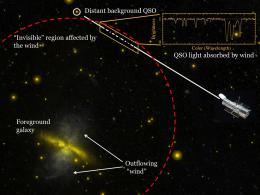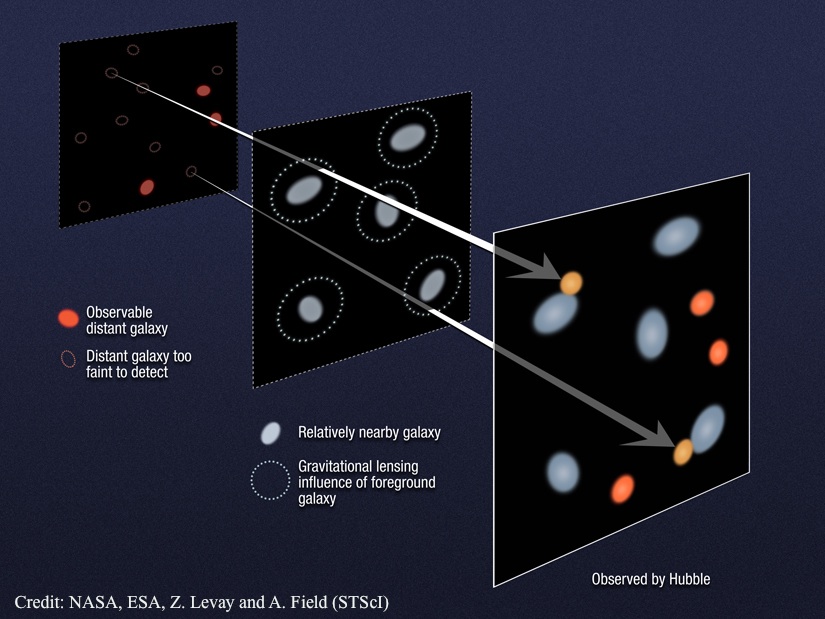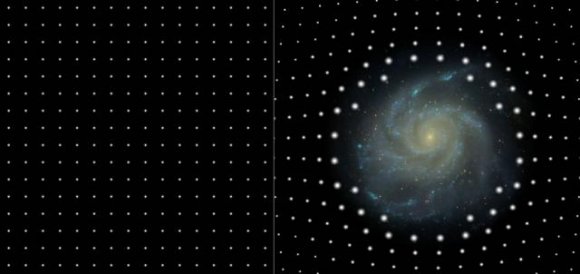It looks like you're using an Ad Blocker.
Please white-list or disable AboveTopSecret.com in your ad-blocking tool.
Thank you.
Some features of ATS will be disabled while you continue to use an ad-blocker.
share:
Almost looks like a travel map to me. Maybe the black matter can be surfed, which would open up interstellar space travel.
Originally posted by Orwells Ghost
Originally posted by CaptChaos
Dark matter is utter nonsense. Magic fairy dust, without which their theoretical equations don't add up.
Instead of thinking the theories might be wrong, and try to come up with some new theories, they say, well, what percentage of everything needs to be magically invisible? There, now the equations come out right. That must be it.
Agreed. Plasma Cosmology explains the cosmos far more elegantly, without having to resort to inherently unobservable constructs to make the math work.
Well, it IS observable thru gravitational lensing. You guys should really submit your ideas to Nature or Science. You might even win a Nobel prize for cosmology
Science is a self-correcting process and is not static. As new observations are made, old theories are modified or new hypotheses are put forward. This is the case with Dark Matter.
Originally posted by Nicolas Flamel
Originally posted by Orwells Ghost
Originally posted by CaptChaos
Dark matter is utter nonsense. Magic fairy dust, without which their theoretical equations don't add up.
Instead of thinking the theories might be wrong, and try to come up with some new theories, they say, well, what percentage of everything needs to be magically invisible? There, now the equations come out right. That must be it.
Agreed. Plasma Cosmology explains the cosmos far more elegantly, without having to resort to inherently unobservable constructs to make the math work.
Well, it IS observable thru gravitational lensing. You guys should really submit your ideas to Nature or Science. You might even win a Nobel prize for cosmology
Science is a self-correcting process and is not static. As new observations are made, old theories are modified or new hypotheses are put forward. This is the case with Dark Matter.
It's not my idea. A bit of independent research on your part would show that. Nor am I an expert on cosmology. It comes down to Occam's Razor; the simple solution is usually the correct one. Gravitational lensing is not proof of unobservable objects, it is an effect to which dark matter has been attributed as the cause. There is no need to construct mathematical objects such as black holes and dark matter, objects which by definition are inherently unobservable, when other theories explain the same phenomena within the constraints of known science and observable (i.e. empirical) events.
Science is indeed non-static. No arguments there. It just takes time for the old ideas to be replaced. If you show a cosmologist these pictures he says "Dark Matter"; that is what he was taught, that is what his world view is constructed upon. Show an electrical engineer the same photograph and he says "Birkland Currents". Though both are means of explaining the observations, only one of these phenomenon is lab testable. Can you guess which one?
reply to post by Nicolas Flamel
What IS observable, Dark Matter? I thought it was undetectable due to its properties of being unable to absorb or emit light. If an effect is observed an inferrence to its cause is not an observation of the cause. What am I missing?
Well, it IS observable thru gravitational lensing.
What IS observable, Dark Matter? I thought it was undetectable due to its properties of being unable to absorb or emit light. If an effect is observed an inferrence to its cause is not an observation of the cause. What am I missing?
Originally posted by DenyObfuscation
reply to post by Nicolas Flamel
Well, it IS observable thru gravitational lensing.
What IS observable, Dark Matter? I thought it was undetectable due to its properties of being unable to absorb or emit light. If an effect is observed an inferrence to its cause is not an observation of the cause. What am I missing?
I posted this earlier, but this pdf describes Dark Matter and gravitational lensing:
www.ifa.hawaii.edu...
I won't read it for you.
Sorry, I thought I posted this thread under Science Forums/Space Exploration, but maybe it should be moved to the Mysterious Subject Matters forums...
reply to post by Nicolas Flamel
Thanks for the link. Validates my statement, inference does not equal observation. I wouldn't go so far as to agree with Mysterious Subjects but I think they like the highly speculative stuff in Skunk Works. Unless you need the last word our brief "conversation" is over.
Thanks for the link. Validates my statement, inference does not equal observation. I wouldn't go so far as to agree with Mysterious Subjects but I think they like the highly speculative stuff in Skunk Works. Unless you need the last word our brief "conversation" is over.
I'm voting for WIMPS cause mystery is more fun! This would open up all sorts of new science and understanding about how things work, I am looking
forward to what is found next! If everything is vibrating, and dark matter sticks things together maybe we can learn to unstick and restick, as in
"Beam me up Scotty" I am an interested lay person and not as you can tell a scientist.
Originally posted by DenyObfuscation
reply to post by Nicolas Flamel
Thanks for the link. Validates my statement, inference does not equal observation.
No one has ever seen an electron. Or a magnetic field. Using your method for 'validation' these things must not exist... (including a Birkeland current).
Originally posted by BagBing
Originally posted by DenyObfuscation
reply to post by Nicolas Flamel
Thanks for the link. Validates my statement, inference does not equal observation.
No one has ever seen an electron. Or a magnetic field. Using your method for 'validation' these things must not exist... (including a Birkeland current).
What method of 'validation'? I said the link validated my statement. What did I say doesn't exist? A magnetic field may be invisible but not undetectable.
reply to post by Iamschist
It's an interesting subject especially since we knew almost nothing about it until recently.
You may be interested in another thread I posted in January about Dark Matter. It shows the association of Dark Matter with galaxies and galactic clusters. It's surprising how far along they've come in only a month with regards to the level of detail.
www.abovetopsecret.com...
Cheers
It's an interesting subject especially since we knew almost nothing about it until recently.
You may be interested in another thread I posted in January about Dark Matter. It shows the association of Dark Matter with galaxies and galactic clusters. It's surprising how far along they've come in only a month with regards to the level of detail.
www.abovetopsecret.com...
Cheers
reply to post by Nicolas Flamel
Thank you I checked it out.
That shoots down my theory about Higgs Boson as the latest information I have read says they believe they attract particles. I will ask you a question I have, if I derail thread, I am sorry. If Higgs Boson attract particles what makes them stop and if they don't stop, do they jump up into bigger and non-quantum particles? Does that question even make sense?
Thank you I checked it out.
They are still trying to figure it out, but dark energy seems to have the opposite effect of gravity in that it pushes things apart rather than attracting them together.
That shoots down my theory about Higgs Boson as the latest information I have read says they believe they attract particles. I will ask you a question I have, if I derail thread, I am sorry. If Higgs Boson attract particles what makes them stop and if they don't stop, do they jump up into bigger and non-quantum particles? Does that question even make sense?
reply to post by Iamschist
I'm not a physicist so my understanding of Higgs bosons is pretty basic. The Higgs field fills all space and gives mass to particles. This mechanism can leave behind Higgs bosons.
Some wiki articles have more information:
en.wikipedia.org...
en.wikipedia.org...
I'm not a physicist so my understanding of Higgs bosons is pretty basic. The Higgs field fills all space and gives mass to particles. This mechanism can leave behind Higgs bosons.
Some wiki articles have more information:
en.wikipedia.org...
en.wikipedia.org...
Originally posted by Nicolas Flamel
reply to post by CaptChaos
It's not purely theoretical. Something is causing the gravitational lensing we can observe in the real world:
The two images illustrate the effect of gravitational lensing. A massive galaxy at the center of the right panel causes the images of the background galaxies (white spots) to be enlarged and brightened.(Image credit: Joerg Colberg, Ryan Scranton, Robert Lupton, SDSS
Dark matter does the same thing except there are no visible galaxies causing the lensing. Maybe you should have read the article.
edit on 13-2-2012 by Nicolas Flamel because: (no reason given)
yea its a galaxy bubble,

in recent articles it has been shown that some galaxies have bubbles around them,
a space based satalite used a back round quaser to get a spectrographic reading of the chemical composition of the bubble intergalactic space boundary
simple optics can expalin some of the gravitational lensing component to the problem,
a mixture of GR and optical physics can be used to derive the "missing mass"

in earlyer NASA releases the ability for these "individual galaxies" to act as lense was a bit of a surprise,
but in light of the argument that dark matter could simply be explained by galaxies being MUCH larger than previously asumed and calculated.
if the optical component (combined with gravity) use used in the explaination,
refractivity or index of refraction would increase/decrease the "power" of the lens.
optical gravitational lenses increase the luminosity and size of objects.
with a new understanding of the galaxy "bubble" we should be able to answer the illusion, that is dark matter.
a good picture is this one of our solar system, i imagine the galaxy one could look similar.

and infact the magnifycation as deplayed in your image with the dots can be directly attributed to density gravitational lenseing. the missing mass being cumulative with a much larger domain for the galaxy than just the visable center portion.
ie the bit were the stars are, is only half the size of the galaxy as a cumulative
xploder
new topics
-
University of Texas Instantly Shuts Down Anti Israel Protests
Education and Media: 1 hours ago -
Any one suspicious of fever promotions events, major investor Goldman Sachs card only.
The Gray Area: 3 hours ago -
God's Righteousness is Greater than Our Wrath
Religion, Faith, And Theology: 7 hours ago -
Electrical tricks for saving money
Education and Media: 10 hours ago
top topics
-
VP's Secret Service agent brawls with other agents at Andrews
Mainstream News: 12 hours ago, 10 flags -
Cats Used as Live Bait to Train Ferocious Pitbulls in Illegal NYC Dogfighting
Social Issues and Civil Unrest: 16 hours ago, 8 flags -
Nearly 70% Of Americans Want Talks To End War In Ukraine
Political Issues: 12 hours ago, 4 flags -
Electrical tricks for saving money
Education and Media: 10 hours ago, 4 flags -
Sunak spinning the sickness figures
Other Current Events: 12 hours ago, 3 flags -
Late Night with the Devil - a really good unusual modern horror film.
Movies: 14 hours ago, 2 flags -
Any one suspicious of fever promotions events, major investor Goldman Sachs card only.
The Gray Area: 3 hours ago, 2 flags -
God's Righteousness is Greater than Our Wrath
Religion, Faith, And Theology: 7 hours ago, 0 flags -
University of Texas Instantly Shuts Down Anti Israel Protests
Education and Media: 1 hours ago, 0 flags
active topics
-
Nearly 70% Of Americans Want Talks To End War In Ukraine
Political Issues • 33 • : andy06shake -
Sunak spinning the sickness figures
Other Current Events • 11 • : McUrnsalso -
Any one suspicious of fever promotions events, major investor Goldman Sachs card only.
The Gray Area • 6 • : ImagoDei -
University of Texas Instantly Shuts Down Anti Israel Protests
Education and Media • 1 • : PorkChop96 -
Reason of the Existence
The Gray Area • 20 • : belkide -
Black mirror, what happened.
Television • 20 • : seekshelter -
God's Righteousness is Greater than Our Wrath
Religion, Faith, And Theology • 25 • : andy06shake -
Russia Ukraine Update Thread - part 3
World War Three • 5730 • : Arbitrageur -
VP's Secret Service agent brawls with other agents at Andrews
Mainstream News • 43 • : Hakaiju -
Everest-sized ‘Devil comet’ Pons-Brooks Visible Now
Space Exploration • 17 • : Compendium

